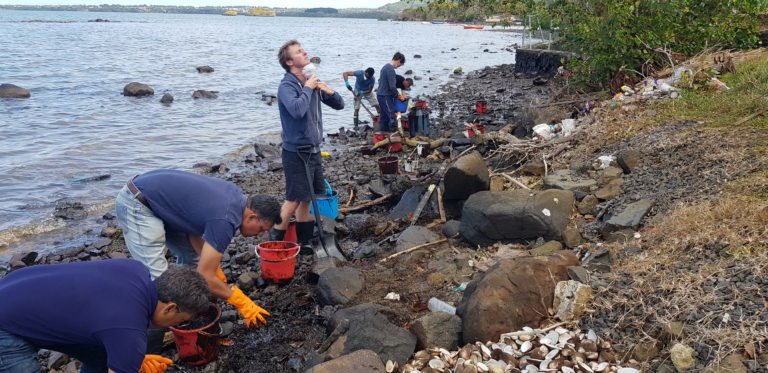Mauritius — On a sunny day in Mahébourg southeast of Mauritius, an island nation in the Indian Ocean about 2,000 kilometers off the south-east coast of the African continent, Shaama Sandooyea (23) is making booms using nets and sugar cane straws.
She is one of the several environmentalists and volunteers working round the clock to avert an environmental disaster–trapping oil before it reaches other coastal regions and lagoons in the Indian Ocean.
More than 1,000 tonnes of oil and diesel leaked from MV Wakashio, a Japanese vessel carrying about 4,000 tonnes of fuel, early August this year, near Pointe D’Esny after the ship had been in the reefs for 12 days.
So far, affected areas include the waters of the blue lagoon outside the coastal village of Mahébourg – a filming area for many Bollywood movies, Riviere des Creoles, Bois des Amourettes, Vieux Grand Port, Anse Jonchée, Deux Frères and Quatre Soeurs.
The Mauritian government led by the Prime Minister, Pravind Jugnauth has responded by declaring the disaster an environmental emergency.
But environmentalists say it has acted too late.

“If the government had listened to (warnings) none of this would have happened. It was not an accident,” says Sandooyea, an environmental activist from the movement Future For Fridays Mauritius.
She says while doing the best to prevent the oil from causing further damage, those responsible should be held accountable.
After catching wind of the news, she went to Mahébourg and “started helping to make booms,” she said.
Sandooyea is one of the thousands of locals that are helping Non-Governmental Organizations to contain the disaster.
International teams from France, South Africa, Russia, India, and Japan have also come to aid the government’s efforts.
This is a bad time for Mauritius and her people.
The disaster has further burdened the nation that is battling the global pandemic, Coronavirus, which has claimed the lives of over 10 people while infecting more than 350, according to the World Health Organization.
COVID-19 imposed travel restrictions around the world, have impacted this island nation’s population of over 1.2 million people who rely heavily on tourism and fishing.
The oil disaster could exacerbate Mauritius’s problems and result in huge impact on pristine lagoons, coral reefs, mangrove forests, and biodiversity.

Stefan Gua, another local volunteer, says the problem requires collective effort.
“We are mobilizing people into one movement so that we can take part in the clean-up campaign as a collective,” he said.

Mehryne Annooar (22), a support educator trainee, told Ubuntu Times that she first heard of the oil spill news while she was in class but she had to do something.
“With the nature of my job I started volunteering during the weekend but I have had to go even during the week,” she said.
It is a desperate situation that calls for a lot of sacrifice.
Angora said she had to pull together all the resources available to contain the oil spill.
“I had long hair. So, since hair is oleophobic, I had to cut it to make the booms,” she said.
Annooar said the booms made of sugar cane straws and nets have proven to be effective in blocking the oil from reaching the shore.
Ile Aux Aigrettes, an Islet off southeast of Mauritius, home to endangered endemic species of Mauritius protected by Mauritius Wildlife Foundation (MWF), a conservation charity, was affected by the toxic air from the oil spill and the animals had to be relocated to safer places.
The MWF reptile team has collected 30 Bojer’s skinks, six bouton skinks, and 30 lesser night-geckos from the various Islets and they are now being kept in a biosecure facility which had previously been built in 48 hours on the mainland, according to the MWF.

The southeast Islets are important habitats for these species which have gone extinct on mainland Mauritius and there are fears that the hydrocarbons may adversely affect these populations, putting 14 years of conservation work at stake.
While the extent of damage is yet to be established some species of fish are seen floating dead while some have been washed to the shores of the beaches and the mangroves’ roots are all covered in oil.
The disaster has destabilized the surrounding communities leading to the closure of schools and leaving many people hospitalized after inhaling toxic air.
Volunteers have not been spared.
Annooar recounts the experience.
“The air is so toxic. It affected my health. I became sick,” she said.
Sandooyea was also affected by the toxic air.
“I started feeling dizzy, nausea and skin irritation,” she said.
People who clean up oil spills are at the risk of developing problems that include skin and eye irritation, neurologic and breathing problems, and stress, according to the United States Department of Health and Human Services.

This is the first human-made environmental disaster to hit Mauritius with such a huge impact.
By the end of the first week of August about 400 sea booms had been deployed in the area.
“We will take a lot of time to clean up this. The area that has been affected spans to about five to six kilometers,” Sunil Dowarkasing, a former global strategist, for Greenpeace International, a non-governmental environmental organization, told Ubuntu Times.
Meanwhile, Fridays For Future Mauritius has written a communique to Prime Minister Jugnauth pushing his administration to act responsibly in protecting the environment.
Despite the risk involved, volunteers and environmentalists such as Sandooyea have vowed to continue with the campaign to clean the oil spills no matter how long it will take.
















